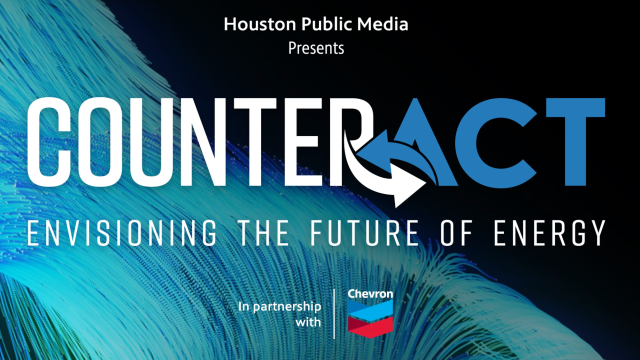One might not associate “public media” with “carrying water for the oil and gas industry,” but it’s 2022, and anything can happen. On Wednesday, Houston Public Radio, which encompasses the city’s NPR affiliate as well as its public broadcasting network, unveiled a series it produced with oil giant Chevron on the energy transition — and, if the first episode is any indication, it’s going to be filled with nothing but fossil fuel propaganda.
The 10-part series, ironically called CounterACT, will explore how “the energy sector is working towards a lower carbon future,” as well as “ways the energy sector can address the climate crisis.” The phrase “lower carbon” is a mostly bullshit term made up by the fossil fuel industry, meant to distract from their continued pollution as well as the fact that we need to reach a zero carbon future, and soon. The industry has applied this phrase to many of the problematic “solutions” it’s currently pushing, like blue hydrogen and carbon capture, that both continue to rely on fossil fuels and do not reliably eliminate emissions. (Last year, oil major Occidental announced it would produce “carbon-neutral oil,” which is just oil with a lot of offsets attached — technically lower-carbon than a regular barrel of oil, but not exactly what’s going to fix the climate crisis.)
The first episode of the CounterACT series, posted Wednesday morning, is an interview with three talking heads — including Chevron’s director of “New Energies” — that focuses on Houston’s reputation as the “energy capital of the world” and the ways in which the region could be primed to contribute to the energy transition. While the video begins with an acknowledgement that the science on climate change “is something that has been settled for quite a long time,” there is no mention of how the oil and gas that Chevron produces directly contributes to climate change. Nor is there any reference to how leading scientists and energy research institutes have said that new fossil fuel exploration needs to be completely phased out this year, and emissions to peak by 2025, in order to avoid the worst impacts of climate change.
The video and accompanying website for the series is listed under the Houston Public Media’s “Programs and Podcasts” tab on its website, which includes other partnership series with companies and organisations like United Way and major hospital systems. The website provides curious readers with a “Resources” tab that provides exactly two links — “Energy Transition” and “Lower Carbon” — both of which go directly to pages on Chevron’s website. While Chevron’s logo is displayed prominently on the graphics for the page, no information about funding is provided, nor any information on the reporting or fact-checking process for the series.
We sent several questions about the series’s reporting process and funding to Houston Public Media and will update this article if they respond. After receiving criticism from reporters on Twitter, the tweet from Houston Public Media promoting the Chevron partnership was deleted Wednesday. Grid News reporter Dave Levitan posted on Twitter Wednesday afternoon that a source informed him that “employees at Houston Public Media received an email from management today instructing them not to engage with criticism of HPM, and that responses should only come from upper management.”
Chevron’s not exactly a stranger to trying to manipulate media to get its message across. Earlier this year, E&E News reported on a set of curious job postings for writers and editors for a “newsroom” Chevron was planning to start in Houston. In the lead-up to a hearing before federal lawmakers on the oil industry and misinformation last fall, Chevron spent $US120,000 ($166,584) in one month to advertise in popular political email newsletters, an Earther and Heated joint investigation found; those advertisements included much of the same language on a “lower-carbon future” that’s present in the CounterACT materials. Chevron has also for years paid for a newspaper in Richmond, California, a town where a Chevron refinery has caused decades of environmental problems in the primarily Black and Latinx community. Chevron’s venture in Houston is, in fact, old hat for the oil and gas industry: Exxon invented what we now know as “paid media” in the 1980s, when it began to take out ads in newspapers designed to look like editorials.
A quick skim of internet history shows that the company has publicly supported Houston Public Media in various fundraising ventures throughout the years, including donating gas cards for raffles, sending employee volunteers to fundraising drives, and matching financial gifts. It’s one thing for a local economic powerhouse, like Chevron is in Houston, to support the public radio station. But a news organisation joining up with polluters to push their specific greenwashing messages — including some that deliberately distort the science on what’s actually needed in the energy transition — is another thing entirely. Looks like Chevron’s “newsroom” is hard at work.
